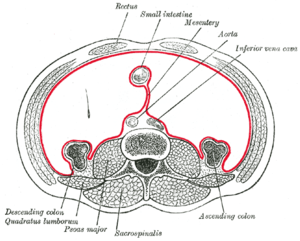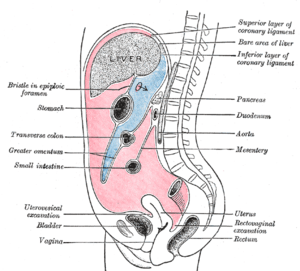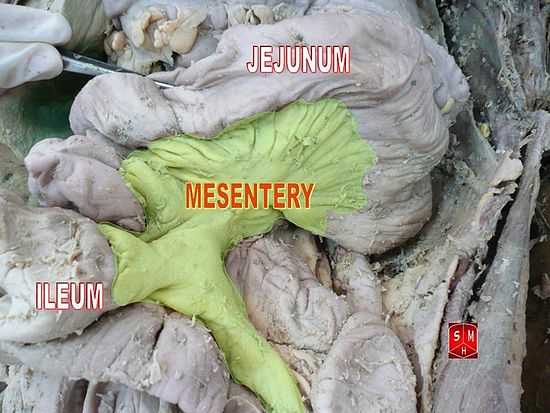- Mesentery
-
Mesentery 
Horizontal disposition of the peritoneum in the lower part of the abdomen. The mesentery is marked with red. 
Vertical disposition of the peritoneum. Main cavity, red; omental bursa, blue. Gray's subject #246 1157 MeSH Mesentery In anatomy, the mesentery is the double layer of peritoneum that suspends the jejunum and ileum from the posterior wall of the abdomen. Its meaning, however, is frequently extended to include double layers of peritoneum connecting various components of the abdominal cavity.
Contents
Mesentery (proper)
The mesentery proper (i.e. the original definition) refers to the peritoneum responsible for connecting the jejunum and ileum (parts of the small intestine) to the back wall of the abdomen. Between the two sheets of peritoneum are blood vessels, lymph vessels, and nerves. This allows these parts of the small intestine to move relatively freely within the abdominopelvic cavity. The brain, however, cannot map sensation accurately, so sensation is usually referred to the midline, an example of referred pain.
The root of proper mesentery extends 15 cm from duodenojejunal flexure at the level of left side of L2 obliquely (toward inferior right) to the ileocecal junction in the right iliac fossa at the level of right sacroiliac joint. The root of mesentery crosses the second and third parts of duodenum, abdominal aorta, Inferior vena cava, right ureter, right psoas major muscle, and right gonadal artery.
Development
The mesentery is derived from what is known in the embryo as the dorsal mesentery. The dorsal mesentery is larger than the ventral mesentery, which gradually becomes other parts of the peritoneum. Most parts of the ventral mesentery are associated with the liver.
Mesentery (general)
Mesenteries are composed of two layers of peritoneum. The peritoneum that lies on the walls of the abdominopelvic cavity (parietal peritoneum) invaginates at certain parts, with an organ inside this invagination. This invaginated peritoneum (visceral peritoneum) will often surround all but a part of the organ ("bare area"), through which the organ transmits blood vessels and nerves. If this organ is invaginated far enough into the peritoneum, the visceral peritoneum will come in contact with itself, forming the organ's mesentery.
Mesenteries in the body:
- Mesentery (proper) - surrounds parts of the small intestine (the jejunum and the ileum)
- Mesocolon - surrounds parts of the colon
- Meso-appendix - peritoneum of the vermiform appendix
- Transverse mesocolon - peritoneum of the transverse colon
- Sigmoid mesocolon - peritoneum of the sigmoid colon
- Broad ligament of the uterus - peritoneum of the uterus, uterine tubes, and ovaries
Pathology
A lack of blood-supply to the mesentery causes mesenteric ischemia.
Invertebrate anatomy
In invertebrates, the term mesentery is used for any tissue that divides the body cavity (coelom) into partitions.
Additional images
Cookery
Among cooks, the mesentery is known as the crow.[1] In classical French cuisine, veal crow (French: fraise de veau) is typically blanched then cooked in stock, and sometimes subsequently fried.[2]
References
- ^ Oxford English Dictionary, s.v. "crow", http://dictionary.oed.com/cgi/entry/50054748 (accessed 8 May 2009)
- ^ Escoffier, A. 1979. The Complete Guide to the Art of Modern Cookery. Trans. H. L. Cracknell. New York: Wiley, 1979. page 310
External links
- SUNY Labs 39:01-0100
- jejunumileum at The Anatomy Lesson by Wesley Norman (Georgetown University)
- McGill
- -1724579760 at GPnotebook
Prenatal development/Mammalian development of digestive system, coelom and septa, and mesenchymal mesenteric masses (GA 11.1101, TE E5.4, 5.8-9) Gut Upper GI tract and accessoryForegut: upper GI (Buccopharyngeal membrane, Rathke's pouch, Tracheoesophageal septum) · accessory (Pancreatic bud, Hepatic diverticulum)Abdominopelvic MesenteryOtherIntra-embryonic coelom · Extra-embryonic coelomCategories:- Digestive system
- Abdomen
Wikimedia Foundation. 2010.



